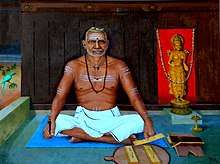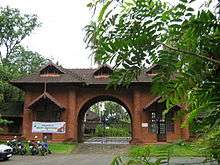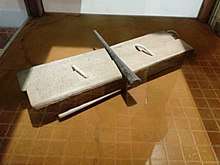Thunchaththu Ezhuthachan
Thunchaththu Ramanujan Ezhuthachan (![]()
Thunchath Ezhuthachan | |
|---|---|
 | |
| Native name | തുഞ്ചത്ത് രാമാനുജൻ |
| Born | 1495 Trikkandiyoor, Kingdom of Calicut (modern-day Tirur, Malappuram, India) |
| Died | 1575 Thekke Gramam, Calicut (modern-day Chittur, Palakkad) |
| Occupation | Poet |
| Language | Malayalam |
Ezhuthachan was born in Trikkandiyoor, near the present day Tirur municipality. After the birth of his daughter, Ezhuthachan became a monk and wandered throughout southern India before finally building his monastery at modern day Chittoor, Palakkad.[3] But at the same time another group believe he was a celibate throughout his life.[4]
Ezhuthachan's contribution to the Malayalam language is widely considered as unparalleled. He brought massive changes and standardisation in the language through his works. He translated the two Hindu epics, the Ramayana and Mahabharata, to Malayalam for the common man with the mingling of the Sanskrit and Dravidian languages.[5]
According to historians and linguists, Ezhuthachan refined the "style" of Malayalam language and it was during his period that Malayalam literature attained its "individuality" and Malayalam became a "fully fledged" independent language. He also brought the language to the level of the non-Brahmins's understanding. Ezhuthachan used Malayalam language to challenge the prevailing social conditions. He is known for using his literary works as a powerful tool against the rule of privileged.[6] Ezhuthachan is also considered as a significant voice of the Bhakti movement in Kerala.[7]
Ezhuthachan's other major contribution has been in establishing an (51 character) alphabet system equivalent to Sanskrit instead of Vattezhuthu, the 30-letter script of Malayalam.[2]
The highest literary honour awarded presented by the Government of Kerala is known as the "Ezhuthachan Puraskaram".[8]Sooranad Kunjan Pillai was its first recipient.[9]
Birth and life
Ezhuthachan is generally believed to have lived around sixteenth century.[10][11] Although poet and turned historian Ulloor S Parameshwara Iyer has argued that he was born in 1495 AD and lived up to 1575 AD, a time frame similar to that later proposed by C. Radhakrishnan, other scholars are not sure about it.[3]
Ezhuthachan was born at Trikkandiyoor, near the modern-day municipal town of Tirur, in Malappuram. His precise birthplace is now known as Thunchan Parambu. His parent's names are not known clearly and there is some confusion about Ezhuthachan's actual name as well. After completing his education, he got married, but embraced sannyasa after the birth of a daughter. But at the same time another group believe he was a celibate throughout his life.[4] Leaving house he travelled to various places in the Andhra region and Tamil Nadu, and learnt Telugu and Tamil. Some scholars surmise that his Ramayana and Mahabharata were adopted from the Telugu versions of these Sanskrit epics.[3]
It is believed that Ezhuthachan on his way back from a pilgrimage to Tamil Nadu had a stopover at Chittur (in Palakkad) and settled down at Thekke Gramam near Anikkode with his disciples. A monastery, then called "Ramananda ashrama" and now known as the Chittur Gurumadhom, was constructed by him on a piece of land bought from the landlord of Chittur.[12][3]
The madhom is flanked by temples of Rama and Siva and the street has an array of Agraharas (where the twelve Brahmin families migrated along with Ezhuthachan live).[13] At the madhom, some of the instruments used by Ezhuthachan are still preserved. A Sri Chakra and a few idols worshipped by him, the stylus, the wooden slippers, and a few old manuscripts are exhibited for visitors.[5] Ezhuthachan's samadhi is also situated there.[3]
Melpathur Narayana Bhattathiri, the author of famous Narayaneeyam, was a friend of Ezhuthachan. It is said that when he sought the advice of Ezhuthachan about how to start his intended book, he gave him a cryptic advice to "start with fish", meaning to start with Matsya avatara - the fish avatar of god Vishnu. Bhattathiri understood the enigmatic message and started composing his poem in the Guruvayur Temple.[3]

Caste of Ezhuthachan
Caste of Thunchaththu Ezhuthachan is arguable. One of the two most popular opinion is that he have belonged to the Ezhuthachan caste, a socioeconomic caste of village school teachers. Modern era historians still differ on their speculations and opinions about it. Following the period of Thunchaththu Ezuthachan, learned people from various other castes adopted and were known by this title, as they had been engaged with the vocation of village school teaching.
The other one is that he belonged to chakkala Nair caste which had the rights to enter brahmanical temples and to participate in worships.
The Malayalam poet and historian Ulloor S. Parameswara Iyer agrees with this oppinion and concludes that Ezhuthachan could be Vattekattu Nair which had the rights to worship in brahmanical temples unlike the ezhuthachan caste members since Thunjath ezhuthachan used to visit temples and engage in worships[14] William Logan also expressed a similar opinion in his Malabar Manual and States that Thunjath Ezhuthachan was a man of Nair or Sudra caste.
[15]
Kottarathil shankunni wrote in his Aithihyamala that the term Ezhuthachan is nothing but a title taken up by school teachers belonging to several castes[16] mainly by Nairs in Northern kerala indicating that Ezhuthachan was a nair.
According to Arthur Coke Burnell in his book "Elements of South Indian Paleography(Second enlarged and improved edition)" page 42 states Thunchath Ezhuthachan belonged to 'Ezhuthachan (=School master)' caste.[17] Writer K. Balakrishna Kurup also reports the same, in his book Viswasathinte Kanappurangal.[18] E. P. Bhaskara Guptan a writer and independent researcher in local history from Kadampazhipuram; supports conclusion of K. Balakrishna Kurup about Ezhuthachan's caste background.[19] Historian Velayudhan Panikkassery also expressing the same opinion.[20]
Other sources consider him as a Kaniyar by caste.[21][22][23][24] This community of traditional astrologers were well versed in Sanskrit and Malayalam.[25][26] During the Middle Ages, when people, other than Brahmins, were denied the right of learning Sanskrit, only the Kaniyar community had been traditionally enjoying the privilege for accessing and acquiring knowledge in Sanskrit, through their hereditary system of pedagogy. They were learned people and had knowledge in astrology, mathematics, mythology and Ayurveda.[25] They were generally assigned as preceptors of martial art and literacy. In addition to the common title Panicker, the members of Kaniyar from the South Travancore and Malabar region were known as, Aasaan/Ezhuthu Aasans/Ezhuthachans (Father of Letters)[27] respectively, by virtue of their traditional avocational function as village school masters to non-Brahmin pupils.[28]
Cultural contributions

Ezhuthachan - although he lived around sixteenth century AD - is considered as the father of modern Malayalam language and Malayalam literature. No original compositions are attributed to Ezhuthachan. However, his contribution to the Malayalam language through Adhyatma Ramayanam is considered unparalleled.
Adhyatma Ramayanam, written in Kilippattu style, is considered as a landmark of Malayalam literature.[29] Ezhuthachan used different Dravidian metres in the cantos of his poems: "Keka" for Bala Kanda and Aranya Kanda; "Kakali" for Ayodhya, Kishkindha and Yuddha Kanda; and "Kalakanchi" for Sundara Kanda.[2][3] Throughout the Malayalam month of Karkkidakam, Adhyatma Ramayanam is still recited - as a religious practice - in Hindu homes in Kerala. According to critic K. Ayyappa Panicker, those who see Adhyatma Ramayanam merely as a devotional work "belittle" Ezhuthachan.[2]
Adhyatma Ramayanam, his other major work Sri Mahabharatam (translation of Hindu epic poem Mahabharata), and shorter pieces Irupathinalu Vrittam and Harinama Kirtanam mark the confluence of Sanskrit and Dravidian linguistic streams.[2] However, there is no unanimity of opinion among the scholars about the authorship of certain other works generally attributed to him (such as Devi Bhagavatam).[3]
Adhyatma Ramayanam(അദ്ധ്യാത്മരാമായണം) is also a spiritual text that gave momentum to the Bhakti cult in Kerala.[2] Ezhuthachan, along with Poonthanam Nambuthiri, was one of the prominent Bhakti devotional poets in Kerala.
Beyond the poetry values Ezhuthachan's works became famous for its cultural and moral values. This specialty of his works gave him the role of a cultural leader in history.[20][30]
See also
References
- Lewis, M. Paul, Gary F. Simons, and Charles D. Fennig (eds. "Malayalam" Ethnologue: Languages of the World. 2014: (Dallas, Texas) Web. 29 Sep. 2014.
- K. SANTHOSH. "When Malayalam found its feet" THRISSUR, 17 July 2014 The Hindu
- "Ezhuthachan Father of literary tradition in Malayalam". Times of India online. 5 July 2003. Archived from the original on 12 March 2017. Retrieved 6 March 2018.
- Kurup, K. Balakrishna (January 2000) [May 1998]. Viśvāsattinte Kāṇāppuṟaṅṅaḷ വിശ്വാസത്തിന്റെ കാണാപ്പുറങ്ങൾ (2 ed.). Mathrubhumi Publications. p. 39.
"അദ്ദേഹം(എഴുത്തച്ഛൻ) ബ്രഹ്മചാരിയായിരുന്നു എന്ന് ഒരുകൂട്ടരും ഗൃഹസ്ഥാശ്രമി ആയിരുന്നുവെന്ന് മറ്റൊരു കൂട്ടരും വിശ്വസിക്കുന്നു. ഗൃഹസ്ഥാശ്രമി ആയിരുന്നുവെന്നതിന്നു അനുകൂലമായ സാഹചര്യതെളിവുകളൊന്നും കാണാനില്ല മറിച്ച് സന്യാസ ജീവിതമാണ് എഴുത്തച്ഛൻ നയിച്ചിരുന്നതെന്നതിന്ന് അദ്ദേഹത്തിന്റ ചിറ്റൂരിലെ ആശ്രമവും അദ്ദേഹത്തിന്റെ കവിതകളിലെ ധാരാളം പ്രയോഗങ്ങളും സാക്ഷ്യം വഹിക്കുന്നു.
ഇന്ദ്രിയനിഗ്രഹമുള്ള പുരുഷന്നു വന്നുകൂടും നിജസൗഖ്യങ്ങളോക്കവേ
എന്നുംസത്സംഗംകൊണ്ടു ലഭിച്ചീടിന ഭക്തിയോടും തൽസേവാരതന്മാരാം മാനുഷർ മെല്ലെ മെല്ലെ ത്വന്മയാരചിതമാം സംസാരപാരാവാരം തന്മറുകരയേറിടുന്നു കാലം കൊണ്ടേ ത്വൽജ്ഞാനപരന്മാരാം മാനുഷ ജനങ്ങൾക്കു- ള്ള ജ്ഞാനം നീക്കുവൊരു സല്ഗുരു ലഭിച്ചിടും
എന്നും പറയുന്ന എഴുത്തച്ഛൻ അധ്യാത്മകാചാര്യപദവിയിൽ ശിഷ്യഗണങ്ങൾക്കു ഉപദേശം നല്കിക്കൊണ്ടു ജീവിച്ചുവെന്നുതന്നെ കരുതാം.ഭക്തി സംയുക്തന്മാരാം യോഗീന്ദ്രന്മാർക്കു നൂനം ഹസ്തസംസ്ഥിതിയല്ലോ മുക്തിയെന്നറിഞ്ഞാലും
എന്നുംരമിച്ചുവസിച്ചോളം വിരക്തിവരുമെന്ന- തൊരുത്തൻ ധരിക്കേണ്ട വർധിക്കും ദിനം പ്രതി
എന്നു രാമായണത്തിലുംസേവിച്ചോളവും നന്നായ് വർധിച്ചു വരും കാമം
എന്ന് ഭാരതത്തിലും എഴുതിയ മഹാത്മാവ് ഗൃഹസ്ഥാശ്രമിയായിരിക്കാനിടയില്ല എന്നേ പറയാൻ വയ്ക്കു." - G. PRABHAKARAN Ezhuthachan’s abode needs a prop CHITTUR (PALAKKAD), 19 October 2013 The Hindu
- "Ezhuthachan's contributions recalled - KERALA - The Hindu". The Hindu online. 21 March 2011. Archived from the original on 27 July 2018. Retrieved 27 July 2018.
- Ezhuthachan gave voice to the voiceless: Azhikode THRISSUR, 27 July 2010 The Hindu
- M.K. Sanoo wins Ezhuthachan Award Kochi, 2 November 2013 The Hindu
- "Ezhuthachan Puraskaram for MT Vasudevan Nair". Mathrubhumi. Archived from the original on 17 November 2011. Retrieved 2 November 2012.
- Burnell, Arthur Coke. Elements of South-Indian Palæography from the Fourth to the Seventeenth Century AD. 1874. p. 35-36. Print.
- "Thunchathu Ezhuthachan". Information and Public Relations Department, Government of Kerala. Archived from the original on 8 November 2009. Retrieved 29 October 2009.
-
Vidwan K. Sankaran Ezhuthachan (1926). Tuñcatteḻuttacchan (jīvacaritram) തുഞ്ചത്തെഴുത്തച്ഛൻ (ജീവചരിത്രം). Thrissur: Mangalodayam press. p. 29.
എഴുത്തച്ഛൻ അവിടെച്ചെന്നപ്പോൾ(ചിറ്റൂരില്), ഇപ്പോൾ മഠവും അഗ്രഹാരവും നിൽക്കുന്ന സ്ഥലം മുഴുവൻ കാടായിരുന്നു. അദ്ദേഹം അന്ന് ചിറ്റൂർ നാടുവാഴിയായിരുന്ന "ചമ്പത്തിൽ മന്നാടിയാരോട്" ഈ സ്ഥലം നാലായിരം പണം കൊടുത്തു വാങ്ങി...
- "Thunchath Ezhuthachan's memorial starved of funds - KERALA - The Hindu". The Hindu online. 14 June 2011. Archived from the original on 8 March 2018. Retrieved 8 March 2018.
- "Great Malayalam poet and historian Ulloor S Parameswara lyer concludes. Ezhuthachan as either Chakkala Nair or Vattekattu Nair". Retrieved 5 May 2020.
- William Logan (1951) [1887]. Malabar manual(Republished). Madras: Govt Press Madras. p. 92.
It was no less than a revolution when in the seventeenth century one Tunjatta Eluttachchan, a man of Sudra(Nair) caste, boldly made an alphabet-the existing Malayalam one derived chiefly from the Grantha-The Sanskrit alphabets of the Tamils which permitted of the free use of Sanskrit in writing-and boldly set to work to render the Chief Sanskrit poems into Malayalam.
- "Aithihyamala". www.amazon.com. Retrieved 5 May 2020.
- Burnell, Arthur Coke (1878). Elements of South Indian Paleography (Second enlarged and improved ed.). Trubner and Co., 57 & 59 Ludgate Hill, London. p. 42.
The application of the Arya-eluttu to the vernacular Malayalam was the work of a low-caste man who goes under the name of Tunjatta Eluttacchan, a native of Trikkandi-yur in the present district of Malabar. He lived in the seventeenth century, but his real name is forgotten; Tunjatta being his 'house' or family-name, and Eluttacchan(=schoolmaster) indicating his caste.
- Kurup, K. Balakrishna (January 2000) [May 1998]. Viśvāsattinte Kāṇāppuṟaṅṅaḷ വിശ്വാസത്തിന്റെ കാണാപ്പുറങ്ങൾ (2 ed.). Mathrubhumi Publications. p. 24.
മലബാർ ഭാഗത്ത് വിദ്യാഭ്യാസ പ്രചാരണത്തിൽ എഴുത്തച്ഛൻമാർ മുന്നിട്ടിറങ്ങിയപ്പോൾ തിരുവിതാംകൂർ ഭാഗത്തു ഗണകന്മാർ ആ ദൗത്യം നിർവഹിച്ചു. എഴുത്തച്ഛന്മാർ വട്ടെഴുത്ത് പ്രചരിപ്പിച്ചതു മൂലവും മലയാളത്തിലെ രാമായണാദി ഗ്രന്ഥങ്ങൾ വട്ടെഴുത്തിൽ(ഗ്രന്ഥാക്ഷരത്തിൽ -)എഴുതപ്പെട്ടത് മൂലവുമാവാം തുഞ്ചത്തെഴുത്തച്ഛനാണ് മലയാളഭാഷയുടെ പിതാവ് എന്ന് പറഞ്ഞുവരാൻ ഇടയായത്. ഭക്തി പ്രസ്ഥാനത്തിന്റെ പ്രേരണക്ക് വിധേയമായി രാമായണമെഴുതിയ കണ്ണശ്ശൻ ഗണകവംശത്തിലും(പണിക്കർ) അധ്യാത്മരാമായണം രചിച്ച തുഞ്ചൻ എഴുത്തച്ഛൻ വംശത്തിലും പെട്ടവരായിരുന്നുവെന്നത് യാദൃശ്ചിക സംഭവമല്ല.
- Guptan, E. P. Bhaskara (2013) [2004]. dēśāyanam(dēśacaritrakathakaḷa) ദേശായനം(ദേശചരിത്രകഥകൾ) (2 ed.). Samabhavini Books, Kadampazhipuram, Palakkad. p. 47.
തുഞ്ചൻ കടുപ്പട്ടഎഴുത്തച്ഛനായിരുന്നുവെന്ന് ശ്രീ. കെ.ബാലകൃഷ്ണക്കുറുപ്പ് വാദിക്കുന്നു. ആചാര്യൻ ചക്കാലനായർ വിഭാഗമായിരുന്നുവെന്നാണ് പണ്ട് പരക്കെ ധരിച്ചിരുന്നത്. അങ്ങനെയായിരുന്നാൽ പോലും അദ്ദേഹം ജനിതകമായി കടുപ്പട്ടഎഴുത്തച്ഛനല്ല എന്ന് വന്നുകൂടുന്നില്ല.
- Origin and Development of Caste’’ by Govinda Krishna Pillai, p. 103, 162
- A Social History of India’’ by SN Sadasivan, p. 371
- Studies in Indian history: with Special Reference to Tamil Nādu by Kolappa Pillay and Kanaka Sabhapathi Pillay, p. 103
- India Without Misrepresentation - Book 3: Origin and Development of Caste by GK Pillai, Director of the Centre of Indology, Allahabad, Kitab Mahal 1959, p. 162
- Edgard Thurston, K Rangachari. Castes and Tribes of Southern India: Volume 1, 2001. p. 186
- Ranjit Kumar Bhattacharya, Nava Kishor Das. Anthropological Survey of India: Anthropology of Weaker Sections, 1993, p. 590
- Raja, Dileep.G (2005). "Of an old school of teachers". Thiruvananthapuram: The Hindu.
- Studies in Indian history: with special Reference to Tamil Nādu by Kolappa Pillay and Kanaka Sabhapathi Pillay, p. 103
- Selected Works of Dr. Ezhuthachan (Volume I & II). K. N. Ezhuthachan Kerala Sahithya Akademi, Thrissur.
- Narayanan, M. G. S (2017). kēraḷaṁ caritravaḻiyile veḷiccaṅṅaḷ കേരളം ചരിത്രവഴിയിലെ വെളിച്ചങ്ങൾ. Kottayam, Kerala: Sahithya pravarthaka co-operative society. p. 106. ISBN 978-93-87439-08-5.
കവിതയുടെ ഇന്ദ്രജാലത്തിലൂടെ നിരക്ഷരകുക്ഷികളായ നായർപ്പടയാളിക്കൂട്ടങ്ങൾക്ക് രാമായണഭാരതാദി കഥകളിലെ നായികാനായകന്മാരെ നാട്ടിലെ അയൽവാസികളെപ്പോലെ പരിചയപ്പെടുത്തുവാൻ എഴുത്തച്ഛനു സാധിച്ചു. ആര്യസംസ്കാരത്തിലെ ധർമശാസ്ത്രമൂല്യങ്ങൾ മലയാളികളുടെ മനസ്സിൽ അദ്ദേഹം ശക്തമായി അവതരിപ്പിച്ചു. ലൈംഗികാരാജകത്വം കൂത്താടിയ ശൂദ്രസമുദായത്തിൽ പാതിവൃത്യമാതൃകയായി സീതാദേവിയെ പ്രതിഷ്ഠിക്കുവാനും പിതൃഭക്തി, ഭ്രാതൃസ്നേഹം, ധാർമ്മികരോഷം മുതലായ സങ്കല്പങ്ങൾക്ക് ഭാഷയിൽ രൂപം കൊടുക്കാനും എഴുത്തച്ഛനു സാധിച്ചു. അതിനുമുമ്പ് ബ്രാഹ്മണരുടെ കുത്തകയായിരുന്ന പൗരാണികജ്ഞാനം ബ്രാഹ്മണേതരസമുദായങ്ങൾക്കിടയിൽ പ്രചരിപ്പിച്ചതിലൂടെ ആര്യ-ദ്രാവിഡ സമന്വയത്തിന്റെ സൃഷ്ടിയായ ആധൂനിക മലയാളഭാഷയും സംസ്കാരവും കേരളത്തിനു സ്വായത്തമാക്കുവാൻ എഴുത്തച്ഛന്റെ പള്ളിക്കൂടമാണ് സഹായിച്ചത്. ഓരോ തറവാട്ടിലും രാമായണാദി പുരാണേതിഹാസഗ്രന്ഥങ്ങളുടെ താളിയോലപ്പകർപ്പുകൾ സൂക്ഷിക്കുവാനും ധനസ്ഥിതിയുള്ളേടത്ത് എഴുത്തച്ഛന്മാരെ നിശ്ചയിച്ച് പള്ളിക്കൂടങ്ങൾ സ്ഥാപിക്കുവാനും അങ്ങനെ കേരളത്തിൽ ജനകീയസാക്ഷരതക്ക് തുടക്കംകുറയ്ക്കുവാനും എഴുത്തച്ഛന്റെ പ്രയത്നമാണ് വഴിവെച്ചത്. അതിന്റെ ഫലമായി പാരായണത്തിലൂടെയും കേൾവിയിലൂടെയും വളർന്ന സംസ്കാരമാണ് കേരളത്തിന് ഭാരതസംസ്കാരത്തിലേക്ക് എത്തിനോക്കാൻ ഒരു കിളിവാതിൽ സമ്മാനിച്ചത്.
External links
- Vishwasathinte Kanappurangal- A compilation of articles about life and works of Thunchath ezhuthachan
- Ramayanam Kilippattu, Mahabharatham Kilippattu by Thunchathth Ezhuthachan, A manuscript of 1870
| Wikimedia Commons has media related to Thunchaththu Ezhuthachan. |